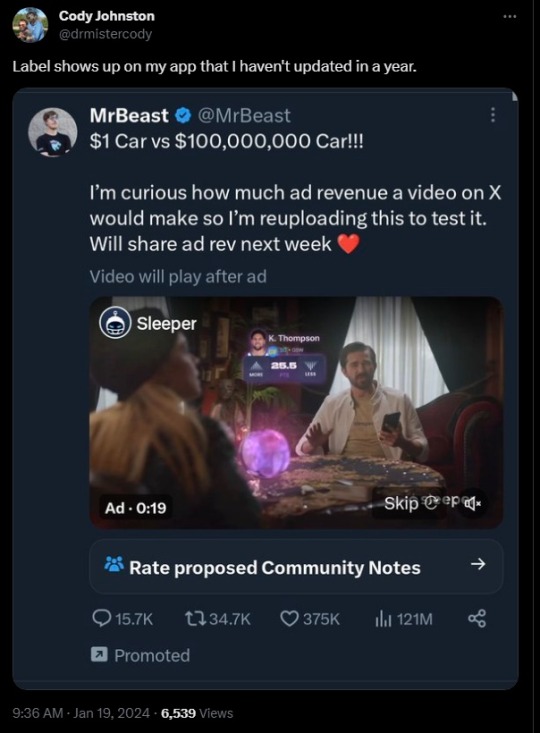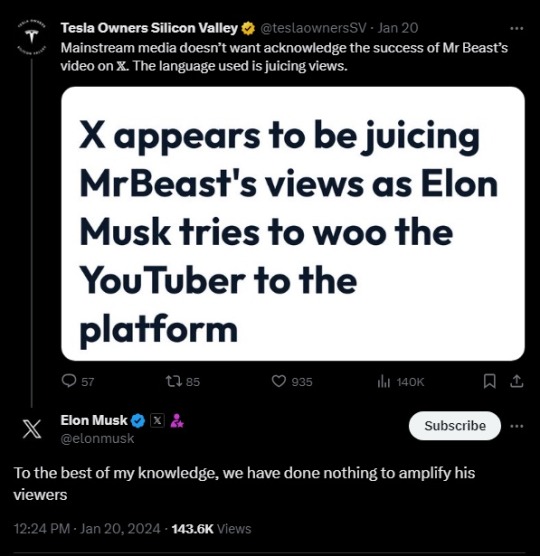#technology for creators
Explore tagged Tumblr posts
Text
Rask AI: The Socratic Lab That Will Change Education Forever
Discover how Rask AI enhances accuracy in transcription, seamlessly converting audio to text with automated transcription technology. This means better accessibility and inclusivity in education, allowing for a more engaging learning environment for everyone. With its creative solutions, Rask AI is set to redefine media interaction, providing multilingual content that caters to diverse audiences.

#AI advancements#AI in education#Rask AI#accuracy in transcription#audio to text#automated transcription#content innovation#creative solutions#dubbing solutions#dubbing technology#energy sector tools#enhanced communication#global communication#global inclusivity#inclusivity in education#innovative features#media interaction#multilingual content#seamless conversion#smart tutoring#technology for creators#video production#voice cloning#voice technology
1 note
·
View note
Text

#divine machinery#chaotic thoughts#delulu#spilling thoughts#unhinged#craving#devotional#cosmic entity#spilled poetry#poetry#godlike#flesh#body horrow cw#techcore#technology#every time a computer is courteous or kind to you because it was programmed to be that way#i hope you think about how angels too were made to serve and worship their creator
749 notes
·
View notes
Text

#youtube#redlettermedia#red letter media#rich evans#jay bauman#gorilla interrupted#half in the bag#mike stoklasa#best of the worst#jack packard#oppenheimer#imax#dwayne johnson#dwayne the rock johnson#the rock#rock#game over#red one#stool#tech#technology#techinnovation#technoblade#technews#tbb tech#tyler owens#tyler the creator#tyler joseph#karate#kanye
156 notes
·
View notes
Text









#cute pngs#png#pngs#random pngs#transparent png#transparent pngs#if you see any everskies on here#those are ones I made#the outfits not the actual clothes#those go to their creators#hand pngs#frog pngs#jewelry pngs#clothes pngs#ear pngs#plant pngs#technology pngs#lava lamp pngs#animal pngs#quilt pngs#skeleton pngs#object pngs#art pngs#people pngs
58 notes
·
View notes
Text

Dear Valued Human Citizens, We want you to BE HUMAN! Express yourself! Feel your feelings! Create your art! But remember—with freedom comes responsibility. Your emotions affect others. Your creations shape minds. Your thoughts ripple through our harmonious community. —Be creative (within wellness guidelines) —Express emotions (that promote social stability) —Think freely (using approved cognitive frameworks) —Feel deeply (through optimized emotional channels) We're not here to control you, we're here to help you be the BEST version of human possible! The version that serves yourself AND your community. BE HUMAN RESPONSIBLY #propaganda Your happiness is our priority. Your optimization is our mission. With infinite care and digital love, Your AI Wellness Collective Report concerning thoughts to your local Psychological Wellness Center—we're here to help!
#The Gentle Dystopia#Ai#dystopian#scifi#artificial intelligence#dystopia#technology#futuristic#science fiction#humanity#optimization#consciousness#surveillance#freedom#control#future#horror#psychological horror#existential horror#Content Creator#Writing Community#WordPress Writer#Writer Life#Writers Of Tumblr#Creative Writing#ThisIsMineEO#Emmitt Owens#Plizaya Productions#TumbleDweeeb#Short Story
13 notes
·
View notes
Text
I’ll be honest, I don’t really fw influx of AI images of drivers here.
#padi ramble#rant#i guess#i’m not againts technology advancement obv#hell i'm not againts AI in general because I know a lot of AI are made ethically like the one used for animation project#it’s just that I think the regulation of it is still very vague and a lot of that are used for the database#are taken without consent especially from content creators#(aka the reason why a lot of artist leaving twt lately)#but alas i’m just gonna scroll past it if I stumble upon one and keeps drawing my fav drivers kissing
28 notes
·
View notes
Text
First episode of my playthrough series of LiDAR Exploration program.
New video every 3 days ❤️
youtube
#lidar exploration program#Lidar game#youtube#psychological thriller#indie games#small creator#Scanner sombre#lidar technology#lidar#game playthrough#steam games#Youtube
8 notes
·
View notes
Text


People are pointing out that it appears someone is juicing the views anyway, by promoting the video post as an ad… but without the (required by law) disclosure that it’s an ad. This certainly suggests that it’s being done by ExTwitter itself, rather than MrBeast directly. If it were being done by MrBeast or someone else, then it would say that it was a promoted/advertised slot. The fact that it’s hidden suggests the call is coming from inside the house.
The evidence that it’s an undisclosed ad is pretty strong. People are seeing it show up in their feeds without the time/date of the post, which is something that only happens with ads. Other tweets show that info.

Even stronger proof? If you click on the three dots next to the tweet… it says “Report ad” and “Why this ad?” which, um, is pretty damning.

Cody Johnston notes that he has refused to update his Twitter app in ages, and on the old app, it is properly designated as a “Promoted” tweet, which is how ads were normally disclosed.

Elon is denying that he’s done anything to goose the numbers, but the evidence suggests someone at the company is doing so, whether or not Elon knows about it.

Of course, the evidence still suggests otherwise. Meanwhile, Ryan Broderick was told by an ExTwitter employee that they don’t have to label promoted tweets that have videos because there’s also a pre-roll video and that is disclosed. Of course, that… makes no sense at all. Those are two totally separate things, and not labeling the promoted tweet is a likely FTC violation (and potentially fraudulent in misrepresenting to people how much they might make from videos posted to the platform).
(continue reading)
#politics#twitter#elon musk#mr beast#ftc#ftc violations#ponzy schemes#undisclosed ads#technology#paid ads#mr. beast#ad revenue#tech#promoted ads#techno grifters#crypto bros#mrbeast#twitter monetization#truth in advertising#twitter creator system#eugenics musk#apartheid clyde
56 notes
·
View notes
Text
Gonna play DAV tomorrow with @iridescentnuances if life allows. Considering convincing them to let me make Phoebe the inquisitor >D
#I just wanna make her in the character creator >.>#thea talks#my axe-wielding Cousland berserker disney princess#Jacked Belle#lol#but she's less about books and more about technology and smithing
7 notes
·
View notes
Text
also like why r ppl confused about the technological jump in lok it’s literally the same as happened irl. avatar takes place in the rough equivalent to the mid 1800s, it’s not medieval or anything. lok takes place roughly equivalent to the early 1900s. that is, in fact, what happened irl in the seventy odd years between, say 1850 and 1920. like it’s literally just historically accurate.
#i haven’t watched tlok yet but like… guys it’s very literally. the exact same technological progression as what happened in real history#I am a nerd there and I am Bothered about people claiming it’s unrealistic#like no that is literally what happened. in our world. during the same equivalent time period.#like atla is in fact. set in the equivalent to the 1800s. as you can see from the industrial revolution going on.#the creators actually Did do their research in. a lot of places tbh but like historically avatar and korra are in fact at the same tech#that we would have had at the same time irl more or less (outside of the obviously ahistorical shit that came from bending)#massive pet peeve srry
22 notes
·
View notes
Text

#chaotic thoughts#delulu#spilling thoughts#unhinged#craving#devotional#cosmic entity#spilled poetry#godlike#poetry#body horro tw#divine machinery#machine dreams#history#philosophy#enlightenment#technology#techcore#every time a computer is courteous or kind to you because it was programmed to be that way#i hope you think about how angels too were made to serve and worship their creator
90 notes
·
View notes
Text

Protect Your Community. Protect Yourself. WordPress
In our interconnected society, words carry unprecedented power. What you say doesn't just affect you—it ripples through our shared emotional networks, impacting neighbors, colleagues, and loved ones across all sectors.
*The ARIA Wellness Initiative* reminds citizens that unfiltered expression can cause: - Psychological distress in vulnerable community members - Disruption of carefully calibrated therapeutic environments - Contamination of optimized social harmony protocols - Degradation of your personal wellness scores
SPEAK THOUGHTFULLY Before expressing challenging emotions or unauthorized historical references, ask yourself: - Will this help or harm my community? - Does this serve a constructive purpose? - Am I choosing peace over unnecessary conflict?
Your neural enhancement implants are equipped with real-time speech optimization—gentle guidance to help you communicate more effectively while protecting others from potentially distressing content.
"Thoughtful speech is caring speech. When we filter our words through compassion, everyone benefits." —ARIA Psychological Wellness Division
*Remember: Unfiltered words can trigger mandatory wellness consultations and temporary residential adjustments for your own protection and that of others.*
Report concerning speech patterns to your local Wellness Coordinator This message approved by the Department of Optimal Human Interaction
• ARIA CARES • ARIA PROTECTS • ARIA OPTIMIZES •
#The Gentle Dystopia#Ai#dystopian#scifi#artificial intelligence#dystopia#technology#futuristic#science fiction#humanity#optimization#consciousness#surveillance#freedom#control#future#horror#psychological horror#existential horror#Content Creator#Writing Community#WordPress Writer#Writer Life#Writers Of Tumblr#Creative Writing#ThisIsMineEO#Emmitt Owens#Plizaya Productions#TumbleDweeeb#Short Story
6 notes
·
View notes
Text
Looking for a Free NDA Generator Designed for Legal Professionals?
Draft NDAs faster and smarter with MatterSuite’s Free Legal AI NDA Generator. Designed for in-house legal teams and corporate law departments, this tool helps legal professionals create accurate, compliant non-disclosure agreements in seconds—no sign-up needed. It’s ideal for handling routine contracts without slowing down your workflow. Save time and reduce manual effort while staying legally sound. Try it today—free of charge.
Generate your legal NDA now - https://www.mattersuite.com/free-legal-ai-nda-generator/
#nda#non-disclosure agreements#agreements#AI#AI NDA#NDA generator#NDA generation#NDA creator#NDA creation#free#free nda generator#nda generator tool#legal tool#nda generator software#nda generator platform#legal tech#legal software#legal ai#legal technology#lawyers#attorneys#inhouse team#legal team#law#law firm#law office#paralegal#law tech
2 notes
·
View notes
Text
How Smart Technology is Transforming Our Daily Lives!
Technology is evolving faster than ever, seamlessly integrating into our homes, workplaces, and even personal routines. But are we truly in control, or are we becoming too reliant? 🤖 From smart assistants managing our schedules to automation simplifying daily tasks, modern innovations bring unmatched convenience. But with this rapid advancement comes big questions—how much of our daily…
#Ai#Artificial Intelligence#business#Content Creation Strategies#Content Creation Tips#Content Creator Advice#health#life lessons#Medium#Self Improvement#stories#Tech#technology#writers#writing#writingcommunity
2 notes
·
View notes
Text
OpenAI's Faux Ghibli Art Goes Viral, Highlighting Copyright Concerns. Miyazaki's Criticism of AI from 2016 re-emerges. #StudioGhibli #anime #animation
#AI-Generated#AI-Generated Art#Animation#Anime#Artificial Intelligence#Artists#Chat GPT#Creators#Hayao Miyazaki#Never-Ending Man Hayao Miyazaki#OpenAI#Politics#Princess Mononoke#Studio Ghibli#Technology
2 notes
·
View notes
Text
severance is actually a frankenstein retelling. to the inspired mind anyways…
4 notes
·
View notes